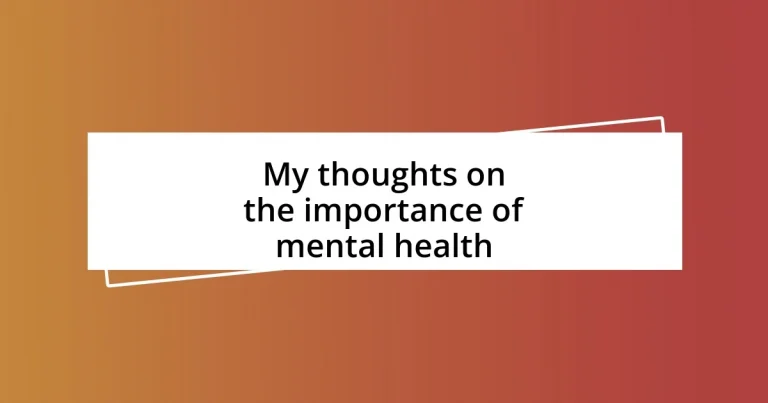Key takeaways:
- Understanding mental health is essential for overall well-being, as it directly influences emotions, productivity, and relationships.
- Common challenges like anxiety, depression, and stress can significantly impact daily life, emphasizing the importance of acknowledgment and coping strategies.
- Accessing professional mental health care and maintaining a robust support system are crucial steps for fostering resilience and achieving long-term mental stability.
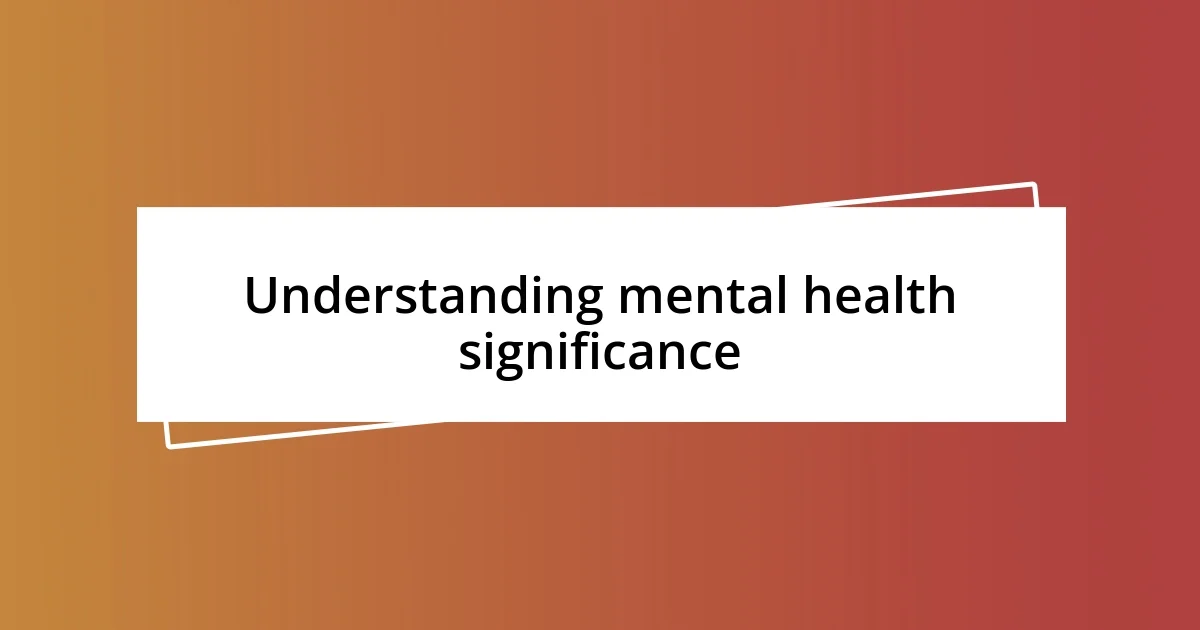
Understanding mental health significance
Understanding the significance of mental health is vital, as it’s intricately linked to every aspect of our lives. I remember a time when I faced a personal crisis; it felt like my world was upside down. During that period, I realized how crucial it was to not just acknowledge my feelings but to address them actively. What we often overlook is that mental health isn’t a luxury; it’s a necessity for achieving overall well-being.
Sometimes, I find myself reflecting on how society tends to prioritize physical health while sidelining mental health. Have you ever noticed how we talk about stress? It’s often dismissed, yet it can lead to serious issues if left unaddressed. In my experience, taking a moment to pause and recognize my mental state has been transformative. It’s a bit like tuning an instrument; if it’s out of harmony, nothing else sounds right.
Ultimately, understanding mental health significance is not just about reducing stigma; it’s about empowering ourselves and others. When I’ve taken steps to nurture my mental well-being, I’ve noticed a direct boost in my productivity and relationships. Does that resonate with you? I think it’s fascinating how interconnected our emotions and our actions can be, guiding us towards a happier, more fulfilled life.

Common mental health challenges
Common mental health challenges often manifest in various forms, significantly impacting daily life. One of the most prevalent issues is anxiety. I can relate to the overwhelming feeling it brings—like constantly waiting for a storm that never seems to pass. This persistent worry can disrupt not just day-to-day tasks but also relationships, leading to a withdrawal from social interactions.
Another common challenge is depression, which can feel like a heavy weight on your shoulders that you can’t shake off. I recall days when getting out of bed felt like climbing a mountain. Such feelings can affect not only our motivation but also our ability to find joy in the things we once loved. To me, acknowledging depression is crucial; it’s the first step toward seeking help and finding strategies to cope.
Lastly, we can’t ignore the impact of stress on mental health. I’ve often found that prolonged stress leads to burnout, a state where everything feels exhausting. This constant pressure can eventually manifest into physical health problems, showing just how intertwined our mental and physical well-being truly are. Understanding these challenges is key to fostering resilience and promoting mental wellness.
| Mental Health Challenge | Description |
|---|---|
| Anxiety | Constant worry that can disrupt daily tasks and relationships. |
| Depression | A heavy feeling that diminishes motivation and joy. |
| Stress | Prolonged pressure leading to burnout and physical health issues. |
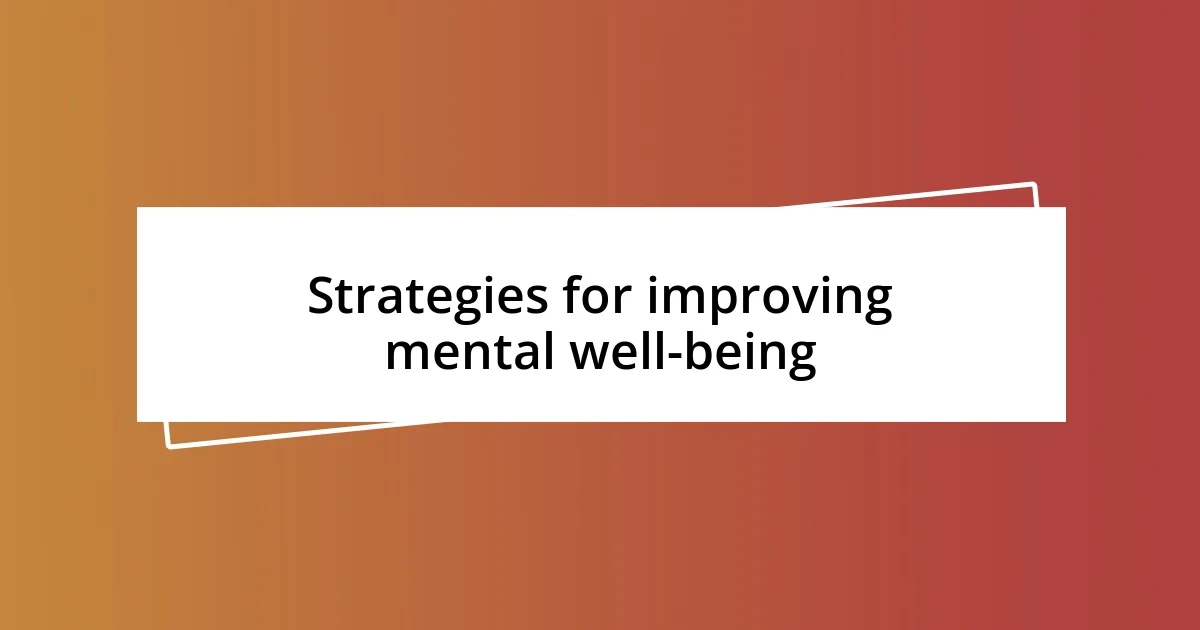
Strategies for improving mental well-being
Strategies for improving mental well-being
Improving mental well-being requires active strategies, something I’ve learned through personal experiences. When I felt particularly low, I began embracing small habits that made a significant difference. For me, establishing a routine was essential—a steady framework that offered a sense of control during chaotic times helped elevate my mood and focus.
Here are some effective strategies you might find helpful:
-
Practice mindfulness: Engaging in mindfulness exercises, like meditation or deep breathing, can ground you in the present moment. I remember feeling like my thoughts were racing, but taking just a few minutes to breathe helped bring clarity.
-
Stay physically active: Exercise was a game changer for me. I often go for walks, and not only does it boost my energy, but it also elevates my mood through the release of endorphins.
-
Maintain connections: Reaching out to friends and family has proven invaluable. I’ve learned that sharing my thoughts, even when it feels daunting, strengthens my support network and reminds me I’m not alone.
-
Prioritize sleep: Adjusting my sleep habits made a world of difference. A solid night’s rest often results in me waking up with a clearer mind, ready to tackle the day.
-
Set achievable goals: Breaking tasks into manageable steps can reduce feelings of overwhelm. I find satisfaction in crossing something off my to-do list, even if it’s just a simple chore.
These strategies, when practiced regularly, have the potential to create a more balanced and fulfilling life.
I’ve also discovered the importance of embracing self-compassion. When I faced moments of self-doubt, reminding myself that it’s okay to struggle alleviated that pressure. I started journaling to express my thoughts without judgment, which was an incredibly freeing experience. In doing this, I acknowledged my emotions and began to cultivate a kinder inner dialogue, transforming the way I viewed challenges.
So, in addition to the strategies above, consider incorporating:
-
Self-compassion practices: Recognizing that it’s okay to be imperfect helps reduce the intensity of negative self-talk.
-
Limit screen time: I’ve noticed that cutting back on social media has improved my mental clarity and mood. It’s incredible how much more connected I feel to my own thoughts when I’m not comparing them to others.
-
Explore creative outlets: Whether it’s painting, writing, or playing music, I find that engaging in creative activities fosters joy and self-expression.
-
Seek professional help: Consulting a therapist was a significant step in my journey. Sometimes, an external perspective helps unlock new strategies for coping.
By weaving these approaches into our lives, we can create a stronger foundation for our mental well-being.
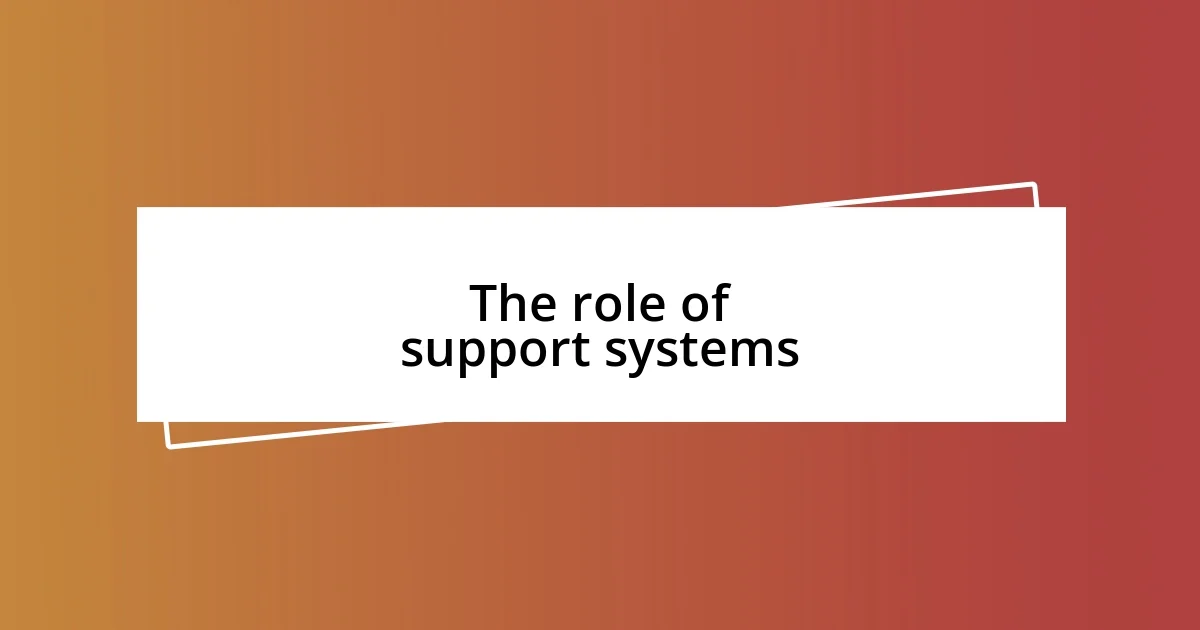
The role of support systems
The role of support systems in mental health is profound and often can’t be overstated. I vividly remember a time when I was feeling utterly engulfed by my thoughts. It was my friends who stepped in and lent an ear when I needed to voice my struggles. Their willingness to listen made a world of difference; I realized then just how vital it is to have a solid support network.
It’s intriguing to consider how different forms of support can come into play. For instance, I’ve personally found that professional help, like speaking to a therapist, can be incredibly grounding. They offer not just expertise but also a safe space to explore feelings. Have you ever thought about how sharing your burdens, whether with friends or professionals, can lighten the mental load? That simple act of connection can lead to profound healing.
Moreover, the emotional insights that come from supportive relationships can enhance resilience. I recall a moment of vulnerability shared with a close friend who had endured similar struggles. As we exchanged stories, I felt an empowering sense of connection wash over me. This experience taught me that support isn’t just about listening; it’s also about understanding and sharing, which helps in building a strong foundation for mental wellness.
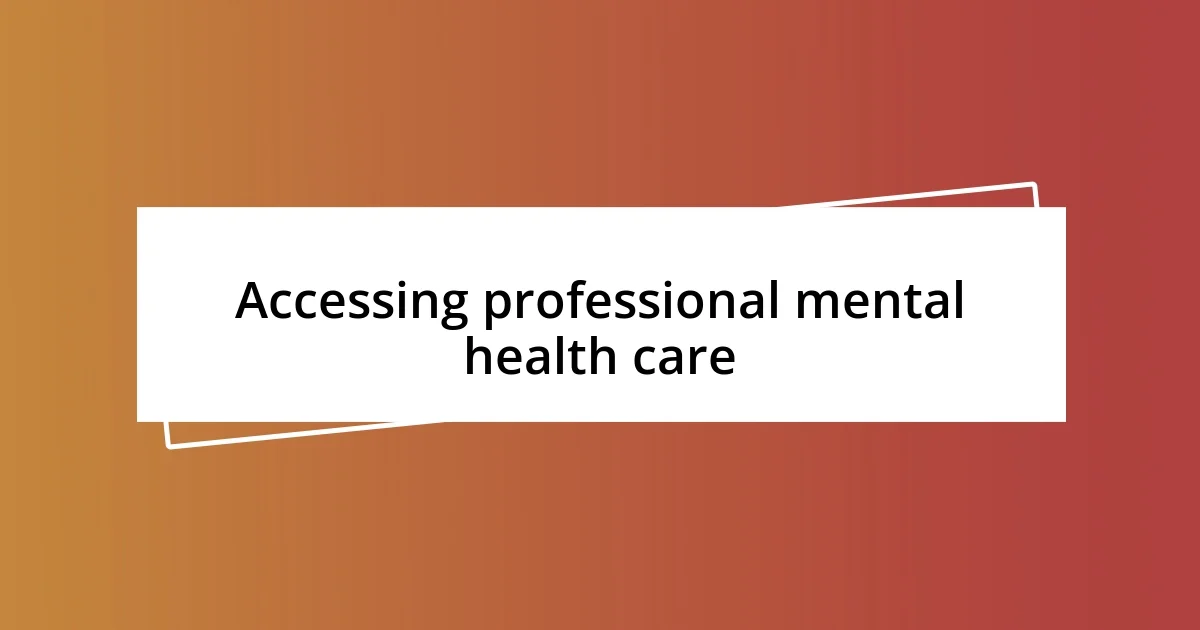
Accessing professional mental health care
Accessing professional mental health care can feel daunting, but it’s an essential step in the journey towards well-being. I remember the first time I reached out to a therapist; I was filled with a mix of apprehension and hope. It was surprising how just making that call felt like lifting a weight off my shoulders. Have you ever faced a similar moment where reaching out seemed scary yet crucial?
When you do decide to seek professional help, remember that finding the right match is vital. It’s similar to dating; sometimes, it takes a few attempts to find a therapist you connect with. I learned that my initial hesitation was common, but once I found someone I resonated with, the therapeutic process became a transformative experience. The insights they offered helped me understand my thought patterns and emotions in ways I hadn’t considered before.
Moreover, the stigma surrounding mental health care is gradually diminishing, which I find encouraging. I’ve spoken with friends who have taken that brave first step and expressed how liberating it felt to share their struggles with a professional. It often leads to a realization that asking for help is a sign of strength, not weakness. Have you considered how impactful it can be to engage with someone who is trained to provide support? It certainly shifted my perspective on mental health care as a vital resource.
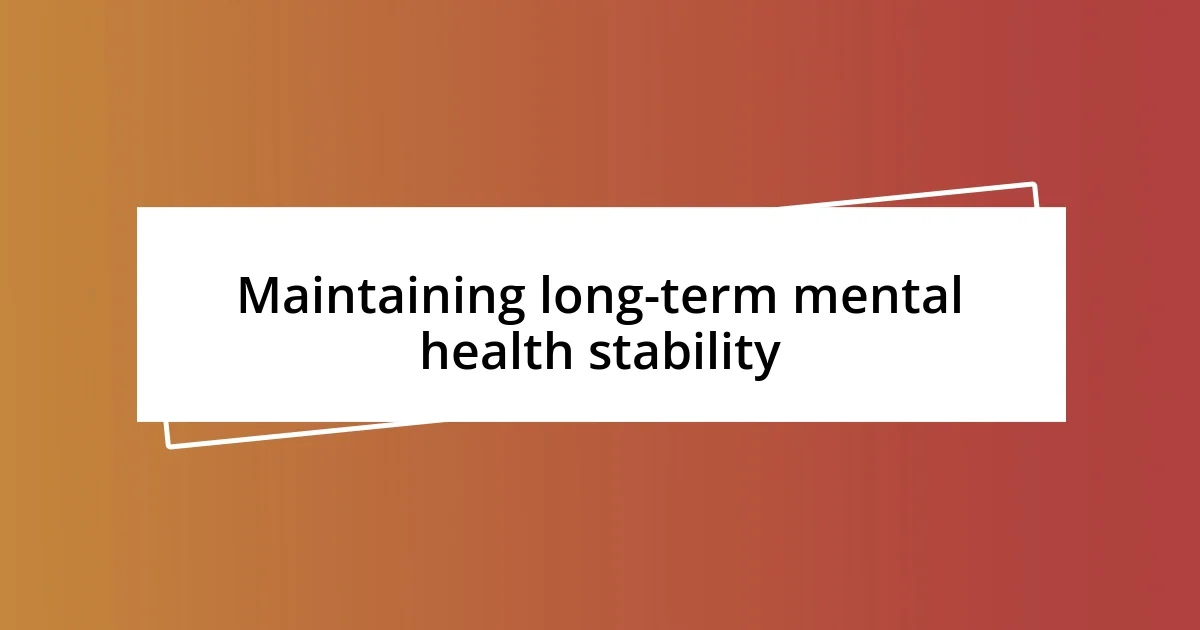
Maintaining long-term mental health stability
Maintaining long-term mental health stability involves cultivating daily habits that nurture the mind and spirit. I’ve come to appreciate the power of routine; something as simple as a morning walk can significantly elevate my mood and set a positive tone for the day. Have you ever noticed how small changes in your routine can lead to a bigger shift in your overall outlook?
I also believe that self-care plays a crucial role in mental health maintenance. For instance, despite my busy schedule, I make it a priority to dedicate time to activities I love, whether it’s painting or reading. This time spent indulging my passions acts as a preventive measure against burnout. Reflecting on my experiences, I’ve realized that self-care isn’t just a luxury—it’s a necessity for sustaining mental wellness.
In addition, regular reflection and mindfulness practices can do wonders for mental health stability. I remember learning to meditate; at first, it felt challenging, but over time, it became a way for me to ground myself amidst chaos. Have you considered how pausing to check in with your thoughts and feelings could enhance your emotional resilience? The insights gained from such practices often allow me to approach challenges with a clearer mind, reinforcing my long-term mental health.












